Semrush recently monitored their database of 20 billion queries to identify which keywords face the lowest amount of competition in the Google search engine.
The idea behind this was so that they could identify which phrases are currently being underutilized, to help companies find some gems when building out their keyword research.
Additional to this they also looked at the flipside of high competition keywords. To see how people were behaving on search engines and what the common phrases were.
We've looked at the study and taken away the key findings for ecommerce retailers in the UK and US.
If your niche doesn't exist in the list don't worry. We've given you some tips on how you can find out the competition for your keywords.
Key Findings of Semrush Keyword Competition Study
US
- The buyer keywords with the lowest competition and highest search volume in the US are ‘affordable plumbing’ and ‘affordable storage.’
- The transactional keywords with the highest competition and lowest search volume in the US are ‘Amazon buy online’ and ‘Buy Buy Baby online.’
- Products with the highest competition were laptops, TVs, cars, beds, face masks, and toilet paper in the US.
- The most popular brands in the US were Apple, Google, Zillow, Nintendo, and Best Buy.
Price queries for both UK and the US were focused on branded electrical goods such as Xbox, Airport, iPhone, and Playstation.
The UK was very different from the US. As you can imagine the monthly search volumes (MSV) were far less. There were also notably more service-based phrases such as SEO, Accountancy, and TikTok views.
UK
- The transactional keywords with the least competition and highest search volume in the UK are ‘Best affordable cordless vacuum' and ‘Best affordable tv.’
- Products with the highest competition were cordless vacuums, cars/vehicles, bungalows, pyjamas, and gym clothes in the UK.
- The most popular brands were eBay, Right Move, Tesco, Apple, and Netflix in the UK
Here is the list of the lowest and highest competition keywords via the US and UK.
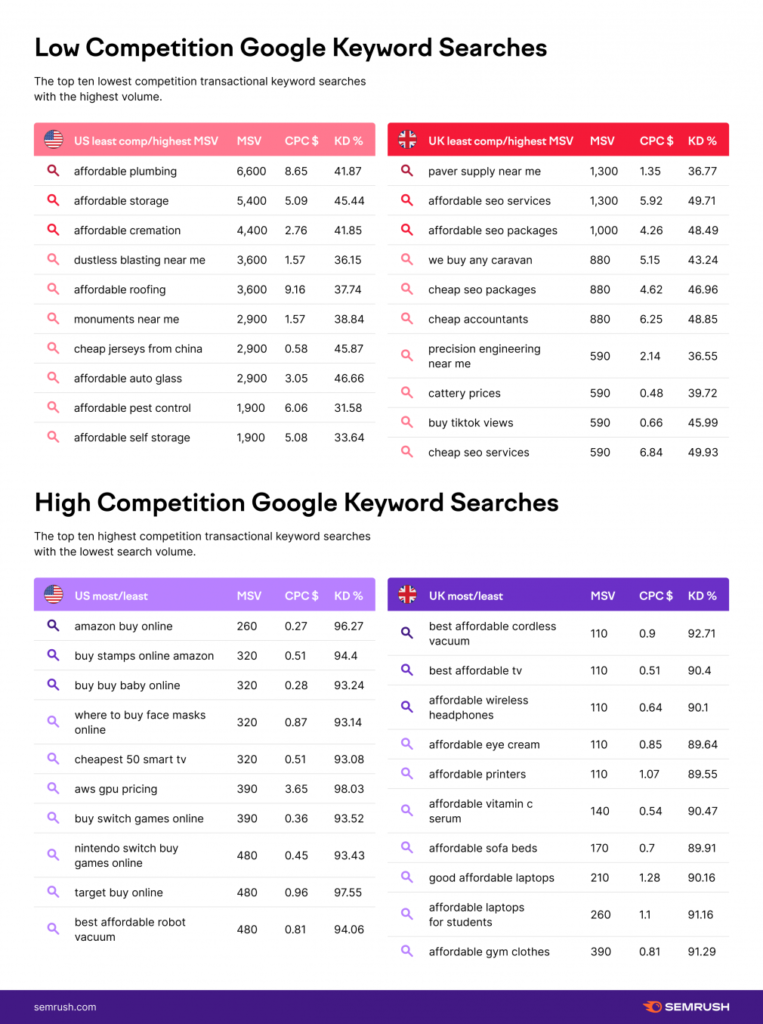
👉 Read the full Semrush keyword study.
Near me searches
Semrush's study highlights how important “near me” searches are.
COVID-19 has had a dramatic impact on the number of searches on Google that contain “near me”. As restrictions meant that people were unable to travel far, buyers have been looking for goods near to them.
What's encouraging as well is that these searches still have fairly low competition, but because of the pandemic they now have high search volume. In the US the 4th and 6th most popular phrases contain this modifier.
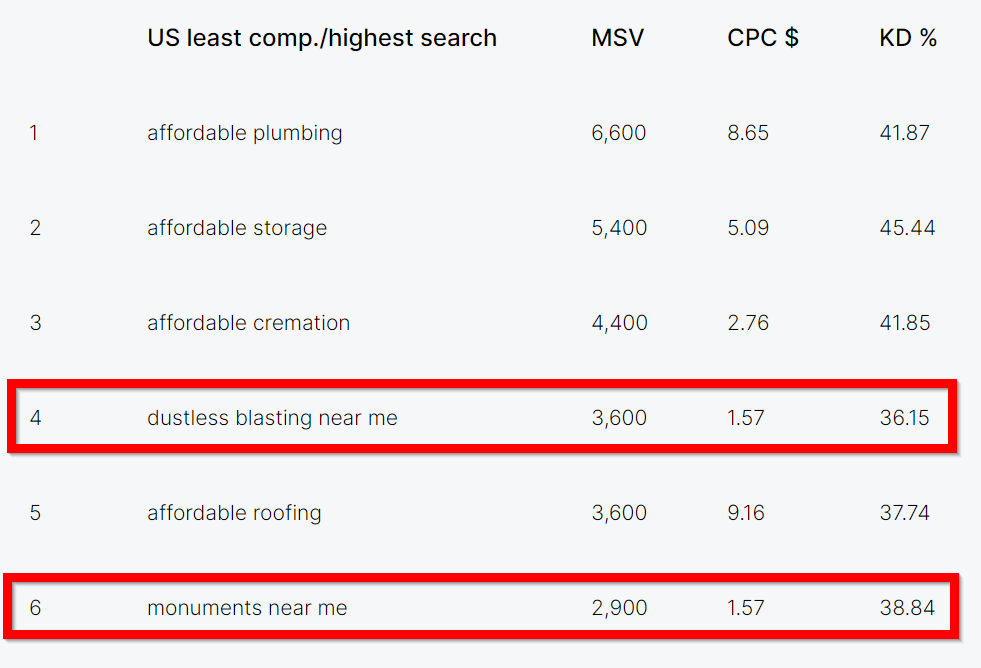
This is the same for the UK where 2 phrases also feature in the top 10. With the “near me” modifier featuring in the #1 spot.
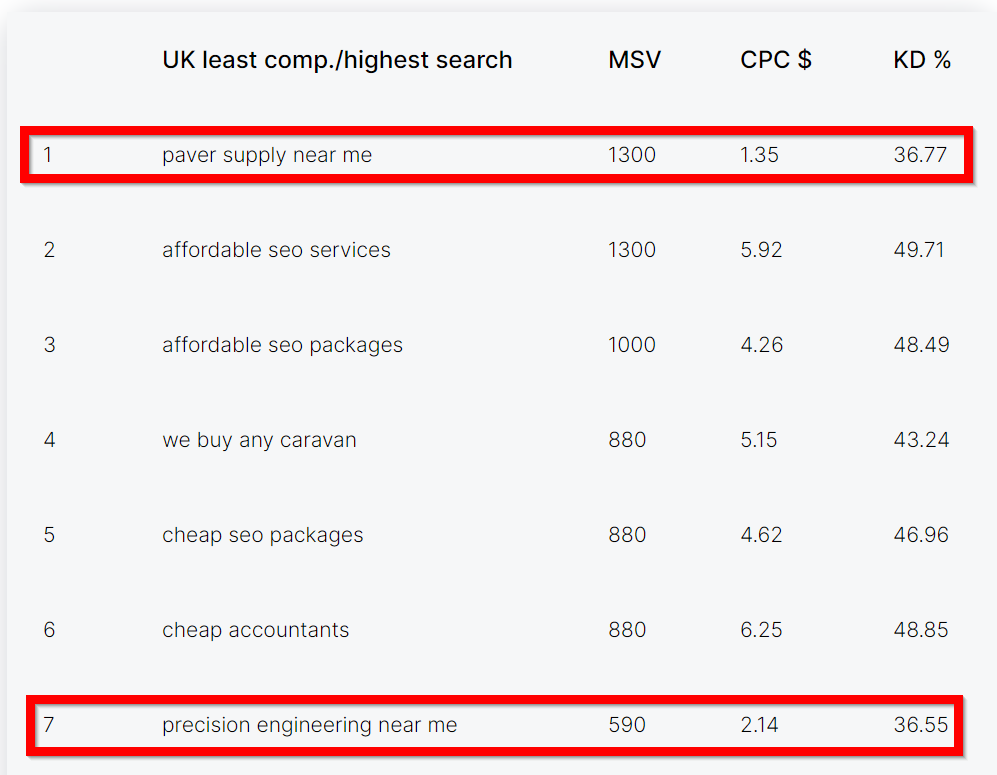
UK vs US
Low Competition
There were very interesting differences between the UK and US for Google searches.
Affordable was the best performing modifier out of the 8 that Semrush chose for the US market. It featured in 7 out of the 10 searches for high volume/low competition.
However, for the UK it only featured twice. Their modifiers were a bit more varied for low competition in the UK with “cheap” being the most popular modifier in the top 10 with 3.
High Competition
Whereas the affordable modifier works brilliantly in the US, it is the complete opposite in the UK. Every single high competition phrase in the top 10 in the UK featured the word “affordable”.
In the US the modifier with the highest
Keyword Research Tools
In order to see which keyword modifiers work best for your industry, there are two tools that we would recommend the Semrush Keyword Research Tool and Google Keyword Planner.
Both of these tools give you the ability to:
- Discover new keywords – help you find keywords related to your business
- Research new keywords – find out search volumes and how those differ over time
- Bid estimates – allow you to plan your budget by seeing estimates on clicks
- Plan – work ahead of time and plan upcoming campaigns by grouping keywords together
The Google Keyword Planner is free to use. You will just need to set create or use an existing Google account.
When you are met with the below screen just click “Switch to Expert Mode” and this means you will bypass your advertising goals and will be able to start doing keyword research.
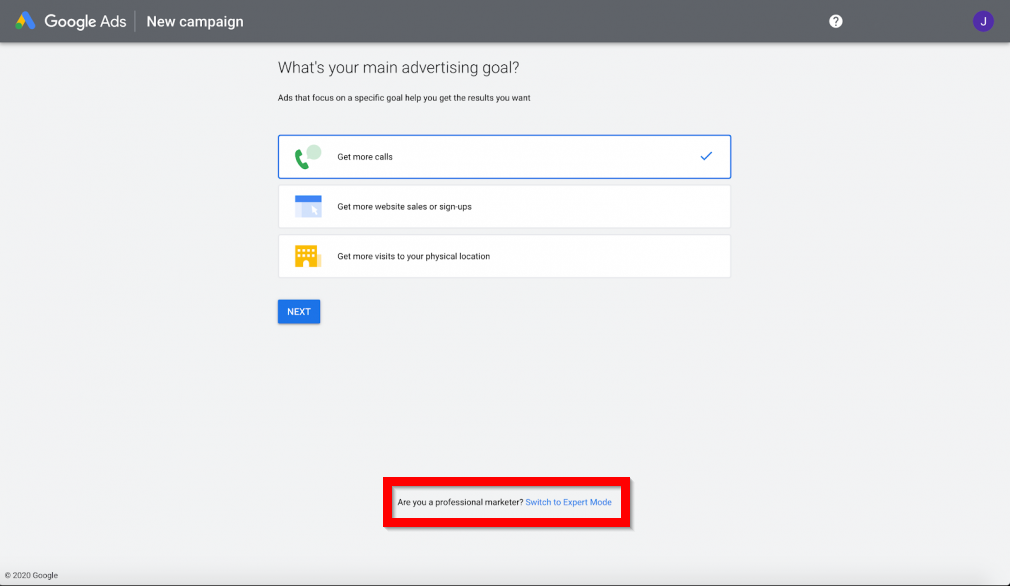
Semrush is a paid-for tool that starts at $99.95 a month. It's worth the investment as it gives you all the functionality of Google Keyword Planner with a few additional add-ons.
- Organic Research – analyze which keywords and pages are working for your competitors
- Keyword Gap – compare your keyword list to your competitor and identify where you can get the upper hand
- Organic Traffic Insights – the “not-provided” keyword list from Google Analytics is so frustrating, here you can find out what those keywords are
Semrush Magic Tool
If the products you sell weren't included in Semrush's list then no worries, we'll take you through how to identify those low competition keywords within Semrush's keyword planner tool.
Within Semrush there is a keyword magic tool. This offers you the chance to enter a keyword or phrase, as well as the country you will targetting.
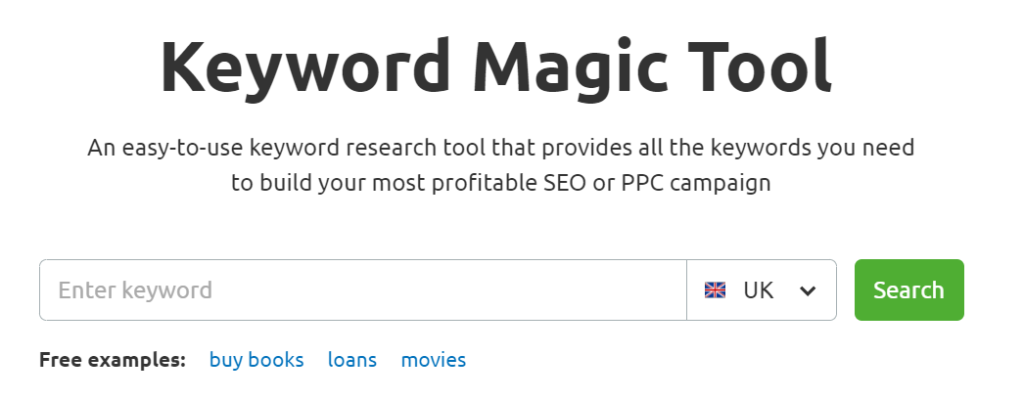
Let's take the term “garden furniture” and look at searches for that within the UK. First off we want to highlight some of the important fields when conducting your keyword research.
How to filter your keywords
Questions – filtering by questions around garden furniture gives you a great list of keywords that would be great for blog posts. “How to make garden furniture from pallets” could make great video content for your target market
Related – this gives you keywords related to your phrase and a relevancy score. This is great for identifying new products or ideas that maybe you hadn't thought of
Exclude Keywords – you may want to remove keywords from your list as “free” or brands such as “Argos”
By number/volume – the left-hand side menu gives you the option to include specific keywords by the number in the list of monthly volume. If you offer garden furniture sets, you may just want to see phrases with sets included
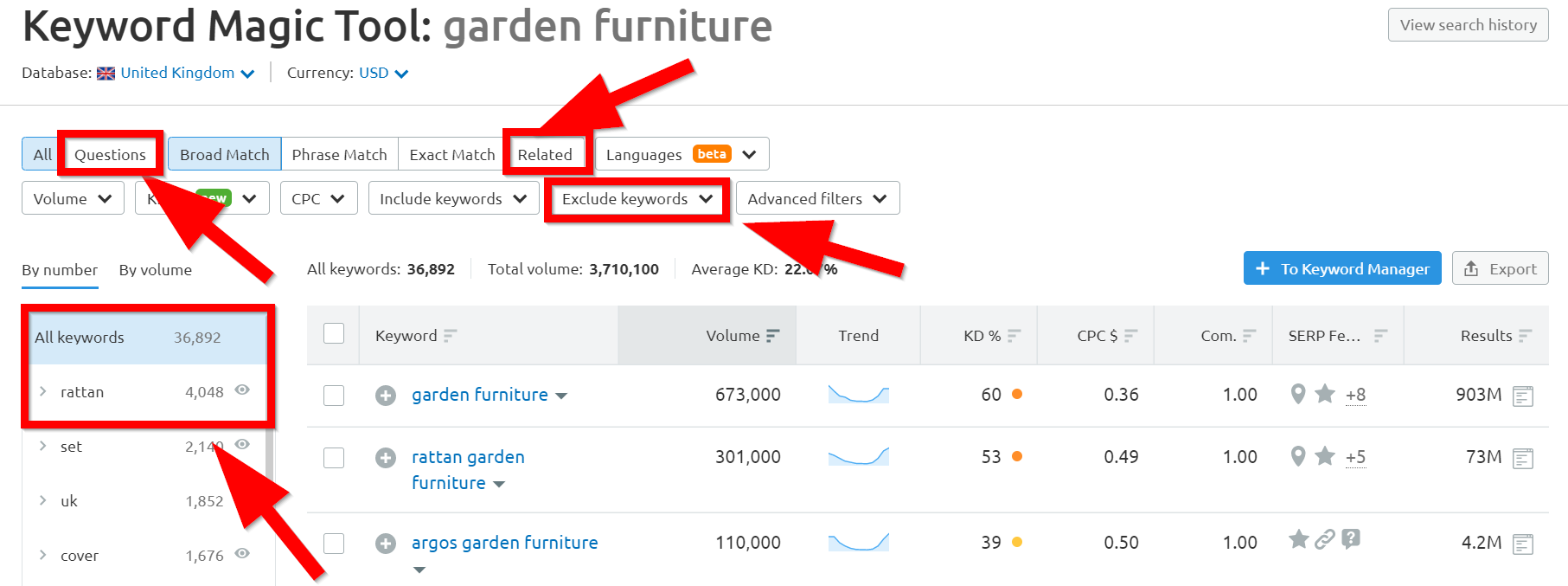
Semrush has included MSV, Cost per click (CPC), and Keyword Difficulty (KD%) in their study, which can all be found in the table when you perform your search. Additionally to this, you will also get:
Trend – this shows the interest in a particular search over a 12 month period. Very helpful if you have seasonal products
Competitive Density – if you're running Google ads, this will show you how competitive that keyword will be
SERP Features – if you want to rank for certain keywords it's worth checking if they have SERP features. This will tell you if there are FAQs for that term, video, a featured snippet, or an image pack. You want to target keywords that have multiple SERP features
Results – this is the number of URLs for that search. The higher this number, the more competitive it'll be
Finding low competition keywords in Semrush
Once you have filtered out keywords and found some good related keywords it's time to find the low competition.
You can sort keywords by how difficult Semrush believes that keyword will be.
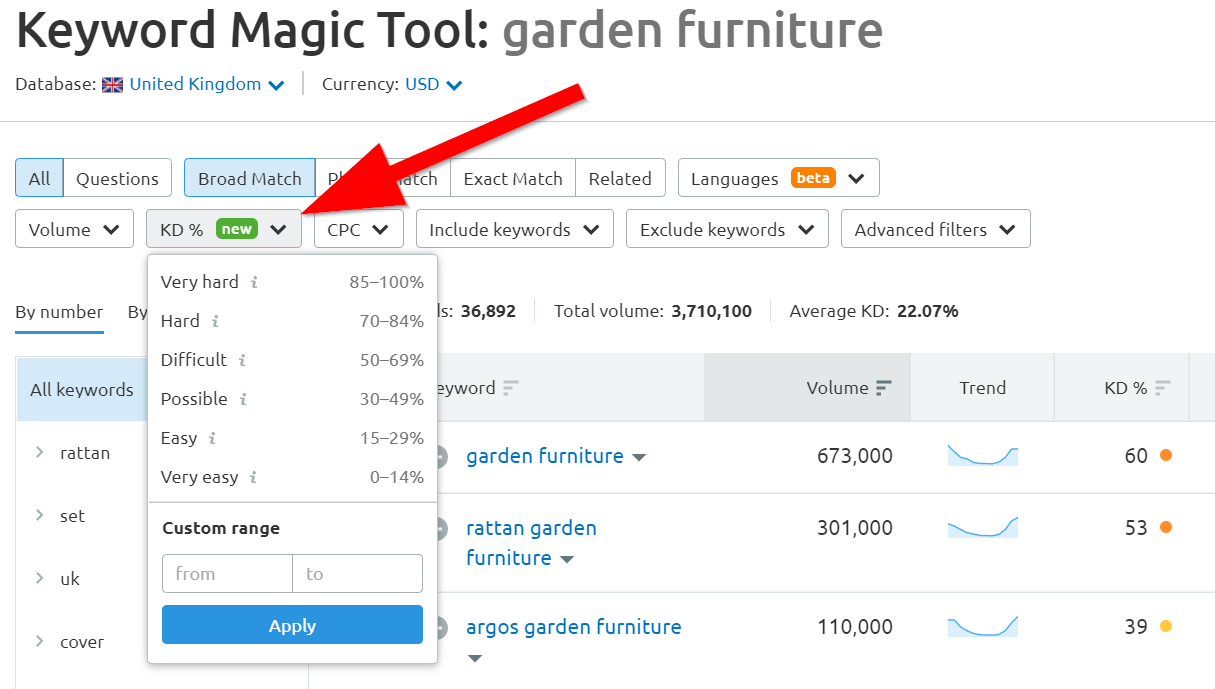
Additionally, it's also worth adding a volume filter as well. You don't want to see keywords that are rankable that nobody is looking for. So add a sensible filter for volume.
Once we have done this we have a very good tangible list. Below are 10 keywords that are “very easy” to rank for and have at least 1,000 searches per month.
There's a good amount of SERP features for these and a clear trend amongst all of these phrases.
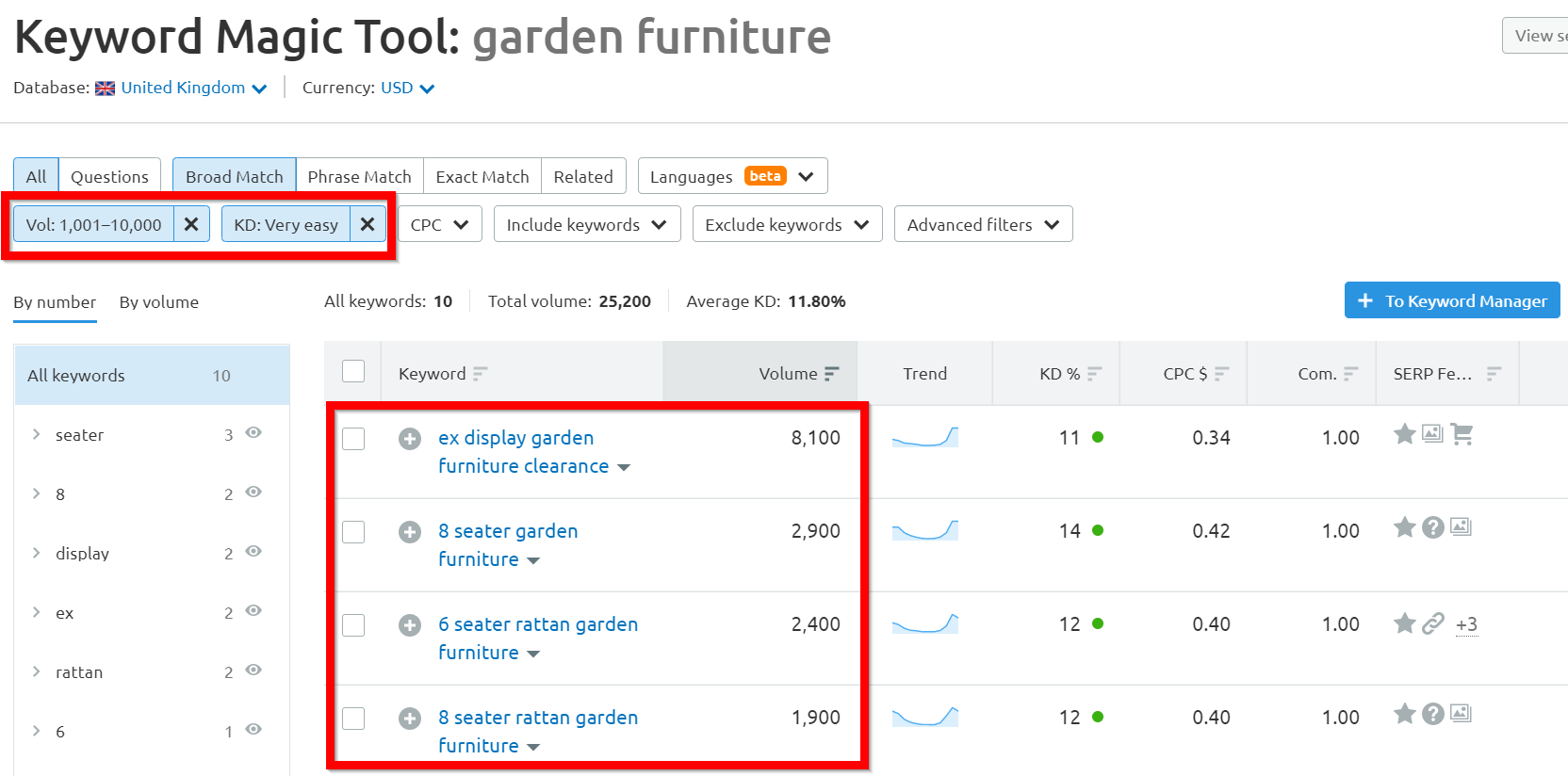
Final Thoughts
Semrush's findings were taken from March 2021. It really illustrates how COVID-19 has affected searcher intent. The rise in “near me” searches in both the US and the UK shows how important local business is.
The impact of COVID-19 will hopefully have a positive long-term impact on the revenue and sales of local businesses.
Ecommerce is bouncing as a result of the pandemic so finding high search volume keywords with low competition is even more important and using a tool like Semrush can really help.
The difference in language between the US and the UK is also startling and we've put together a brief explainer of the modifiers.
US
Low competition = affordable
High competition = buy
UK
Low competition = cheap
High competition = affordable




Comments 0 Responses